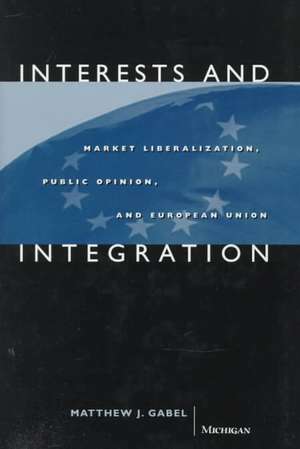Interests and Integration: Market Liberalization, Public Opinion, and European Union
Autor Matthew Joseph Gabelen Limba Engleză Hardback – 3 mar 1998
Integration in Europe has been a slow incremental process focusing largely on economic matters. Policy makers have tried to develop greater support for the European Union by such steps as creating pan-European political institutions. Yet significant opposition remains to policies such as the creation of a single currency. What explains continued support for the European Union as well as opposition among some to the loss of national control on some questions? Has the incremental process of integration and the development of institutions and symbols of a united Europe transformed public attitudes towards the European Union?
In this book, Matthew Gabel probes the attitudes of the citizens of Europe toward the European Union. He argues that differences in attitudes toward integration are grounded in the different perceptions of how economic integration will affect individuals' economic welfare and how perceptions of economic welfare effect political attitudes. Basing his argument on Easton's idea that where affective support for institutions is low, citizens will base their support for institutions on their utilitarian appraisal of how well the institutions work for them, Gabel contends that in the European Union, citizens' appraisal of the impact of the Union on their individual welfare is crucial because their affective support is quite low.
This book will be of interest to scholars studying European integration as well as scholars interested in the impact of public opinion on economic policymaking.
Matthew Gabel is Assistant Professor of Political Science, University of Kentucky.
In this book, Matthew Gabel probes the attitudes of the citizens of Europe toward the European Union. He argues that differences in attitudes toward integration are grounded in the different perceptions of how economic integration will affect individuals' economic welfare and how perceptions of economic welfare effect political attitudes. Basing his argument on Easton's idea that where affective support for institutions is low, citizens will base their support for institutions on their utilitarian appraisal of how well the institutions work for them, Gabel contends that in the European Union, citizens' appraisal of the impact of the Union on their individual welfare is crucial because their affective support is quite low.
This book will be of interest to scholars studying European integration as well as scholars interested in the impact of public opinion on economic policymaking.
Matthew Gabel is Assistant Professor of Political Science, University of Kentucky.
Preț: 526.29 lei
Preț vechi: 626.54 lei
-16% Nou
Puncte Express: 789
Preț estimativ în valută:
100.71€ • 107.69$ • 83.97£
100.71€ • 107.69$ • 83.97£
Carte indisponibilă temporar
Doresc să fiu notificat când acest titlu va fi disponibil:
Se trimite...
Preluare comenzi: 021 569.72.76
Specificații
ISBN-13: 9780472108565
ISBN-10: 0472108565
Pagini: 192
Ilustrații: 33 tables, 8 figures
Dimensiuni: 152 x 229 x 23 mm
Greutate: 0.51 kg
Ediția:First Edition
Editura: UNIVERSITY OF MICHIGAN PRESS
Colecția University of Michigan Press
ISBN-10: 0472108565
Pagini: 192
Ilustrații: 33 tables, 8 figures
Dimensiuni: 152 x 229 x 23 mm
Greutate: 0.51 kg
Ediția:First Edition
Editura: UNIVERSITY OF MICHIGAN PRESS
Colecția University of Michigan Press
Notă biografică
Matthew Gabel is Assistant Professor of Political Science, University of Kentucky.
Recenzii
"Given its theoretical novelty and empirical rigor, Gabel's Interests and Integration merits a place on the bookshelf (and syllabi) of every serious student of European integration. This book represents the state of the art in an empirical work on public support for integration and is likely to serve as the point of reference and inspiration for the study of public attitudes during the next decade."
—Leonard P. Ray, Binghamton University, SUNY, American Political Science Review, December 1999
—Leonard P. Ray, Binghamton University, SUNY, American Political Science Review, December 1999
". . . Interests and Integration is significant because it represents a true work of political economy. . . . [Gabel] begins with known economic theorems and extends them for their political implications. In so doing, he weaves a story of how material markets and political markets are seamlessly connected, a rarity in the field of political economy."
—Mershon International Studies Review
—Mershon International Studies Review
Descriere
Explains differences in public support for integration in Europe
